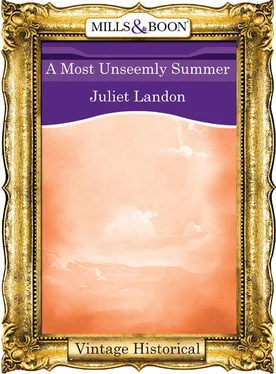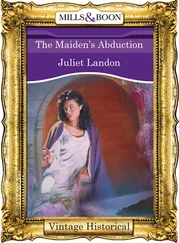‘In the dark? Come now, lass, don’t take me for a fool. You couldn’t keep away, could you? You had to go to remind yourself or to chastise yourself. Which? Do you even know which?’
Goaded beyond caution, she broke the barrier of his arm and pushed past to stand well beyond his reach, panting with rage and humiliation. ‘Yes, Sir Leon, I do know exactly why I returned, but never in a thousand years would you be able to understand. Of course,’ she scoffed, ‘you believe it was for your sake, naturally, being so full of yourself and all. But it was not, sir, I assure you. It was not. Did you believe you’re the first man who’s ever kissed me?’
She noticed the slight shake of his head before he answered. ‘On the contrary, lady. I am quite convinced that I am not the one who lit the fire that rages inside you, and I also know that you are feeding it on some resentment that threatens to burn you up. Which is yet another reason why you’ll be better down here at Wheatley doing what Deventer expects of you rather than moping about up in Sonning with little to do except think. Or are you so eager to continue wallowing in your problems unaided?’
‘My problems, as you call them, are not your concern, Sir Leon, nor do I need anyone’s aid either to wallow or work. And I’m stuck here with no transport, thanks to your interference, so what choice do I have now but to stay?’
‘Less than you had before, which was what I intended.’
‘You are insufferable, sir.’
‘Nevertheless, you will suffer me, and I will tame you. Now you can go.’
‘Thank you. I was going anyway.’ She stalked away, fuming.
That prediction at least was true, though she missed the smile in his eyes that followed her first into a dark cupboard and then into a carpenter’s bench and a pile of wood-shavings.
‘Where the devil am I?’ she turned and yelled at him, furiously.
His smile broke as he set off towards her.
‘Come,’ he said, laughing.
A lthough the notion had taken root in Felice’s mind that she might have to stay at Wheatley Abbey after all, Sir Leon’s high-handed tactics hardly bore the hallmarks of subtle persuasion. Added to their disastrous introduction, it was this that made her almost wild with anger and humiliation to be so brazenly manipulated first by Lord Deventer and then by his surveyor. It was almost as if they saw it as some kind of game in which her wishes were totally irrelevant. As for his talk about taming her, well, that was ludicrous. Men’s talk.
‘Tamed, indeed!’ she spat. ‘You’ve bitten off more than you can comfortably chew, sir!’ She threw a fistful of bread scraps to the gaggling ducks, scowling approvingly at their rowdiness.
Her companion on the afternoon stroll was Mistress Lydia Waterman, whose insight was heart-warming. ‘Take no notice, love,’ she called from further along the river’s edge. ‘You know what they’re like. They have to be given a sense of purpose. We could do worse, though, than be stranded in a place like this, and at least you have plenty to do. Just look at it; it must have been swarming with monks twenty years ago.’
To one side of them the river cut a tight curve that enclosed the abbey on two sides before disappearing beyond the mill into woodland. Where the grass and meadowsweet had recovered from the builders’ feet, creamy-white elder blossom drooped over ducks, geese and swans that jostled for food. They launched themselves into the water in dignified droves as Felice’s two deerhounds pranced towards them.
Wheatley Abbey had been left in ruins for twenty years after the English monasteries were closed and their wealth taken by the present queen’s father, Henry VIII. But the villagers had won permission to keep the church for their own use while the rest of the abbey buildings had been bought by Lord Deventer whose programme of rebuilding had already lasted two years. During that time, his talented thirty-year-old surveyor had restored and converted first the Abbot’s House and then the New House, which had once been the monks’ refectory, dormitory and cellarium. The enclosed cloister still awaited attention, and the guesthouse, which at present stood apart from the other buildings, was being used as Sir Leon’s offices and some of the masons’ accommodation. There was still plenty to be done, but work on the New House was almost complete: courtyards, kitchens, stables and smithy, storerooms and dairy had all been rebuilt from the monks’ living quarters.
Even the church had had to adapt to the religious changes of the last twenty turbulent years. The young Queen Elizabeth was more reasonable than her forebears in her dealings with religion, but even she was not immune to pressure from her councillors to take a harder line with those who found the changes too difficult to accept, like Felice’s mother, for instance. Lord Deventer himself cared little one way or the other but had taken on the young chaplain, Timon Montefiore, for the sake of his staunch Roman Catholic new wife who saw no harm in breaking the law every day of the week while relenting for an hour or two on Sundays, just to avoid being fined.
Felice and Lydia strolled along the river’s edge in silence in the direction of the village and a wooden bridge under the dense white candles of a chestnut tree. A familiar figure came from the opposite side, joining them midway over the green swirling depths where a rowing boat was tied to one of the bridge supports. A clutch of small children fished with excited intensity, calling to Dame Celia as she crossed.
‘They’ve been doing that for centuries,’ she smiled. ‘I did it myself when I was a wee child, though never on a Sunday.’
‘You lived here as a child?’ Felice said. ‘I didn’t realise.’
Slowly, they meandered along the opposite side of the river away from the thatched rooftops that appeared through the trees. Dame Celia pointed the way she had come. ‘Down there,’ she said, ‘at the end of the village. You’d have passed Wheatley Manor the other day as you came through. My parents owned it, but now my brother and his family live there. John and I have the priest’s house on the Wheatley estate.’
‘So you went away to be educated, Dame Celia?’ said Felice.
‘With the nuns at Romsey until I was fifteen. It’s only a few miles away. But it was closed down at the same time as Wheatley and everyone was turned out. I was fortunate in being able to come home, but the nuns and novices had a much harder time of it.’
They sat on a log that had recently been felled, its stump still oozing with sticky resin. Lydia sat on Dame Celia’s other side. ‘Then you didn’t consider taking vows?’ she said.
‘Not I!’ Dame Celia laughed. ‘You see, John had been abbot of Wheatley only a year when the abbey closed. He was the youngest ever. And I had returned home to live when he took the post as chaplain to my parents, and as vicar at the church here. No one had better qualifications for those jobs than the former abbot. So that’s how we came together.’
Felice’s heart skipped a beat. Chaplain and employer’s daughter. ‘Did your parents approve?’ she said.
Dame Celia’s comfortable face crumpled in amusement. ‘Certainly not, my lady. But John was given a goodly pension and he was very persuasive. But it was a very unsettled time, you know, with all the changes. At first, the former monks and nuns were allowed to marry; priests were even allowed to marry their former mistresses and concubines. Then the young King Edward decided they were not, and we swung from being Catholic to Protestant twice in the space of four reigns, m’lady, and it left everyone a bit troubled. Especially people like Dame Audrey and her Thomas.’
Читать дальше












